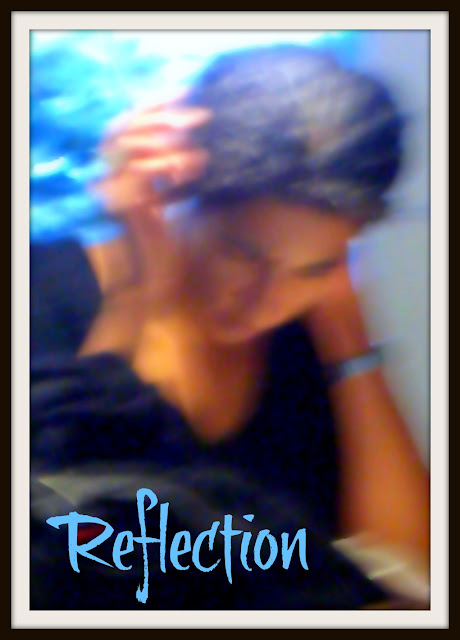The original title of this image was "Girl with Cigarette," and she wasn't reflecting; she was reading the newspaper in Etam on the rue de Rivoli in Paris.
I was having lunch on the top floor of Etam one day with a point and shoot camera with a 10x zoom when I saw her, reading the newspaper (on her lunch hour, probably), the smoke curling up over her head.
She was exotic looking, with some Negroid features, such as her hair and dark skin, as many French people are. They are a mixture of so many different ethnic groups that it's hard to name a race that they belong to.
I had a friend from Cali, Colombia once who came to the University to get her master's degree. On the registration papers where it asked for race, it gave her three choices: White, Black, Indian. She marked all three.
But -- back to "Girl with Cigarette." She was so completely absorbed in her reading that she didn't notice when I took out my camera and pointed it in her direction (she was maybe 12 or 15 feet away). And so, I captured her for myself for poserity, and I look at her whenever I want to be reminded of this mood of "reflecting" or "reflection."
Like many French working women, she was dressed simply in black with no ostentatious jewelry, hair pulled back in a bun. But she was striking for some reason. And I am reminded of some more words used to describe French women on a video of Ines de la Fressange, doing a short presentation for one of the French department stores on dressing "a la Parisienne." She was interviewing another French woman whose name I didn't get, but the concepts are the same.
The question was something like, "What is it that makes French women so attractive?" And the words they used were these: "decontracte," "panache," "nonchalant," and of course the French favorite "chic."
NONCHALANT is, also, used a fair bit by some people, possibly more in writing than in speaking, with its French meaning of "unconcerned" or "indifferent." It is interesting, however, that the French word "chaleur" means "warmth." So "nonchalant" would be our equivalent of "cool," emotionally. Not too eager, or as the young people would say not "in your face."
PANACHE is seen and heard less, except when one is talking about style or decoration, as in the home or in dressing. The English synonyms are "dash," "flamboyance," or "verve," and usually refer to personal behavior or style. Interestingly enough, the French meaning is "multi-colored" or "mixed," which was my immediate reaction to the young woman in Etam, and refers literally to a tuft of multi-colored feathers on some fowl, which gives them a striking appearance.
DECONTRACTE, however, caught my attention because I had never heard it used in French until I started reading my fashion blogs in French, where it comes up frequently. It has no English cognate, however, and sounds, to my ears, a bit harsh. It means "relaxed," "not up tight," and the French adore it as a compliment. They use it over and over when refering to a woman who does not give the impression of caring how she looks or of caring what other people think of how she looks. Her hair is not "done;" her outfit doesn't "match;" her make-up is "au naturelle." Nothing about her gives the impression that she spends many hours and many euros taking care of herself and her appearance.
I think "decontracte" is my favorite, maybe because it's new to me, and maybe because it belies the number of skin care products alone that can be purchased in all French pharmacies, one of the reasons I love Paris so much.
My own favorite line of French creams is L'Occitane, though I think you have to go to their boutique or one of the big department stores to get it. Their "Immortelle" line of face products is made using the essential oil from a flower of that name which grows in Provence. I used 'Creme Divine' as long as I could afford it, and I still make a place in my budget for their 'Brightening Shield' which has SPF 40 in it.

No comments:
Post a Comment